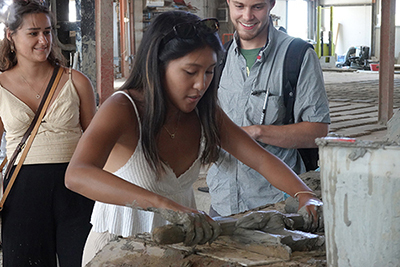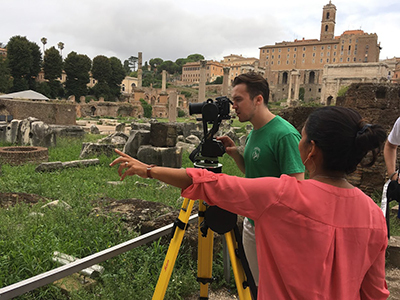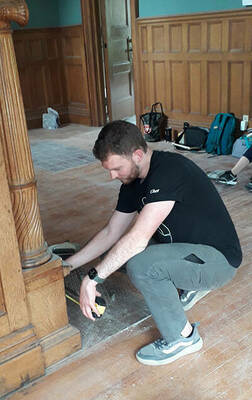Master of Science in Historic Preservation

Historic Preservation is About the Future
Historic Preservation is a field that embraces both art and science. Preparing students to enter this field requires a multi-disciplinary approach to a broad range of subjects, including architectural history and design, social sciences, building materials and systems, conservation methods, environmental science, transportation, urban and regional planning, and landscape design. Drawing upon the resources of The Michael Christopher Duda Center for Preservation, Resilience, and Sustainability, the Master of Science in Historic Preservation (MSHP) program at Notre Dame includes all of these areas of study, integrating them within a distinctive perspective on the relationship between the historic built environment and contemporary art and culture.

Engaging Lessons from the Past
The curriculum emphasizes not only the tangible heritage of physical structures and landscapes, but also the intangible heritage of knowledge, craft traditions, and formal languages that constitute the building cultures that produced our historic places and that, in many cases, survive or are recoverable today. Finally, the program sees preservation as a means of responding to the challenges of climate change and other environmental issues. Preservation, from this viewpoint, becomes a bridge uniting past, present, and future.
The mission of the MSHP program is to prepare students to become leaders in architectural design, preservation consulting, government service, and heritage advocacy. The program emphasizes respect for cultural heritage as the basis for informed conservation and the design of harmonious new development. The curriculum presupposes that knowledge of and care for historic places can provide essential means for building more resilient and sustainable development in the future. These objectives are pursued in the context of the Catholic ideals of community, environmental stewardship, and civic engagement.
The Program
MSHP students study for four semesters, including one semester in Rome, plus one introductory summer course and a second summer internship. The program’s faculty includes recognized leaders in the field, and the semester in Rome offers a unique opportunity for students to work with international professionals and researchers involved in heritage conservation at the highest level. Interdisciplinary coursework, field study, and individual research offers students opportunities to develop the knowledge, skills, and perspective necessary to graduate with readily marketable skills, excel in this growing field, and advance the discipline in both the academy and the profession.
The studio coursework consists of:
- a foundational traditional architecture studio.
- an on-campus urban conservation studio.
- one architectural and urban conservation studio in Rome.
- and a terminal studio project or thesis in the student's fourth semester.
A minimum of 55 credit hours are required for graduation. Required studio and seminar courses are supplemented by other courses in History and Theory of Preservation, Research and Documentation of Historic Buildings, Historic Construction and Materials, Historic Preservation and Climate Change, and Preservation Practice, among others. Students will also have opportunities for electives either within or outside the School of Architecture.

Students admitted to the two-year MSHP degree must hold a Bachelor of Art in Architecture, Bachelor of Science in Architecture, Bachelor of Architecture, or Master of Architecture degree, or its international equivalent. Students with other degrees may be admitted to the program upon showing evidence of sufficient previous study and skills to complete the required coursework for the MSHP. Those without previous architectural study are invited to apply to the Master of Architecture degree program at Notre Dame and then complete the MSHP with two additional years of study.
The MSHP program at Notre Dame is recognized by the National Council on Preservation Education (NCPE). The program is generously supported by The Michael Christopher Duda Center for Preservation, Resilience, and Sustainability, established by a gift of the Fritz and Mary Lee Duda Family Foundation.
Inquiries regarding the MSHP program and application may be directed to Steven Semes, Director of Michael Christopher Duda Center for Preservation, Resilience, and Sustainability, or Samantha Salden Teach, Assistant Dean of Graduate Studies.